The Sacrament Blu-ray Movie
HomeThe Sacrament Blu-ray Movie 
Magnolia Pictures | 2013 | 99 min | Rated R | Aug 19, 2014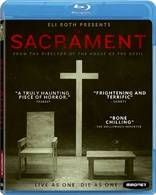
Movie rating
6.5 | / 10 |
Blu-ray rating
| Users | 0.0 | |
| Reviewer | 4.0 | |
| Overall | 4.0 |
Overview
The Sacrament (2013)
When a photographer is contacted by his long-lost sister, who is living abroad in an isolated commune, he goes to visit her with two journalists from the news program VICE. The community they find in the jungle, led by a charismatic preacher known as "Father," is idyllic on the surface, but is there more?
Starring: AJ Bowen, Joe Swanberg, Amy Seimetz, Gene Jones (I), Kate Lyn SheilDirector: Ti West
| Horror | Uncertain |
| Thriller | Uncertain |
Specifications
Video
Video codec: MPEG-4 AVC
Video resolution: 1080p
Aspect ratio: 1.78:1
Original aspect ratio: 1.85:1
Audio
English: DTS-HD Master Audio 5.1 (48kHz, 24-bit)
Subtitles
English SDH, French, Spanish
Discs
25GB Blu-ray Disc
Single disc (1 BD)
BD-Live
Playback
Region A (locked)
Review
Rating summary
| Movie | 3.5 | |
| Video | 4.0 | |
| Audio | 4.5 | |
| Extras | 3.5 | |
| Overall | 4.0 |
The Sacrament Blu-ray Movie Review
If They Survive, They Could Win a Pulitzer
Reviewed by Michael Reuben August 18, 2014The Sacrament is generally lumped into the "found footage" horror genre, but the description isn't adequate. It's more accurate to call it a docudrama about a horrific crime, although the crime has been fictionalized. Writer, director and editor Ti West (The House of the Devil) has long been fascinated by the 1978 "Jonestown Massacre" at the Peoples Temple founded by cult leader Jim Jones in the South American country of Guyana. West's original notion was to develop a miniseries chronicling the actual story, first the hopeful founding and development of the Peoples Temple by American émigrés and then its bloody unraveling, but the filmmaker realized he might have to wait years for sufficient funding for such a massive project. Instead, he reconceived the effort as a contemporary story reported by Vice Media, the alternative news source with a presence in publishing, web content and cable TV. Vice's owners readily granted permission for the use of their name. If a documentary crew with the latest digital recording technology had been present at the Peoples Temple, they might have captured something like The Sacrament (although West couldn't afford enough extras to replicate the scale of that tragedy, in which over 900 lives were lost). The difference between The Sacrament and a typical "found footage" production is that the photography, while shot "on the run", looks like it was done by a professional news crew, and it has been edited into a coherent story, complete with titles that supply commentary and context that would only be possible if someone made it out alive with the footage. Right up until the end, though, it is unclear who has returned with the news crew's recordings. It doesn't necessarily have to be the crew members. West has said that he wants to work in genres other than horror, and The Sacrament could be seen as a transitional work, even though the film was co-produced by Eli Roth (Hostel), whose name figured prominently in the publicity campaign. The film is tense, suspenseful and, ultimately, gruesome in a way that, according to the Blu-ray commentary, often prompted walkouts at screenings. But it doesn't rely on the monsters, deranged serial killers or supernatural forces that are the horror genre's stock-in-trade. Everything in The Sacrament is credible, logical and clearly foreshadowed, even if the viewer is unfamiliar with the history of Jonestown. More a thriller than anything else, The Sacrament has been treated as a horror film not only because of who made it, but also because it doesn't flinch from showing a particular type of murder in intimate closeup.
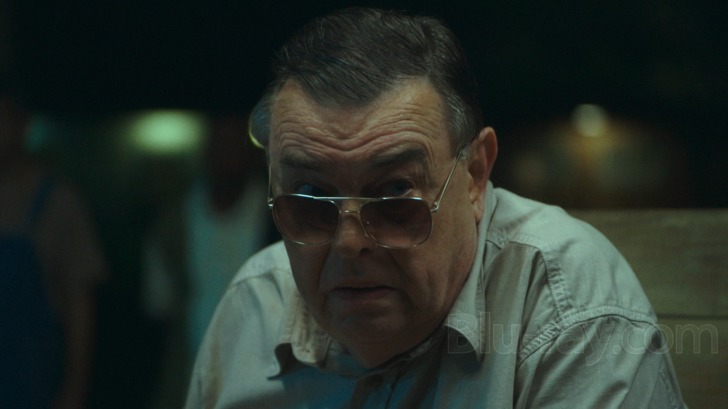
The Sacrament is presented as the documentary resulting from a trip made by a Vice news team consisting of lead reporter Sam (AJ Bowen) and cameraman Jake (Joe Swanberg)—both veterans of You're Next and A Horrible Way to Die—along with photographer Patrick Carter (Kentucker Audley, Ain't Them Bodies Saints). The story they're following has a personal angle. Patrick's sister, Caroline (Amy Seimetz, also a veteran of You're Next and A Horrible Way to Die, as well as Upstream Color), is a former drug addict who disappeared for a long time, but she has written asking that Patrick visit her in her new home in a spiritual enclave somewhere outside the country. (The location is purposely left vague.) The documentary team sets off expecting to record the Carter family reunion, but immediately upon their arrival they realize that something else is happening. The helicopter pilot who deposits them in the designated location is jumpy. The escorts who drive up to bring them to Caroline carry machine guns and seem perturbed when they find that Patrick is accompanied by Sam and Jake. The tenor changes only when Caroline meets them at the gate of the community known as "Eden Parish". As the visitors tour the idyllic spot built from scratch by the collective that Caroline has joined, they interview various residents, who are a rainbow mix of ages, races and nationalities. All of them credit their leader, known as "Father", for giving them hope and purpose. Caroline has arranged for an interview at the regular gathering that evening. The Sacrament would not work without a convincing central performance that lives up to the advance billing of the charismatic leader who persuaded all these people to leave their homes, donate all their property and follow him into a wilderness to build a paradise. West was fortunate enough to cast in the role of "Father" a character actor named Gene Jones, one of those reliable professionals on whom filmmakers depend to fill out small parts with credible performances but who rarely get the chance to explode on screen as Jones does here. Previously best known as the gas station owner forced by Javier Bardem to bet his life on a coin toss in No Country for Old Men, Jones so effectively dominates the crowd and the film that, on the commentary, West says Father's lines no longer sounded like something he'd written. Jones seemed to be inventing them in character. In the lengthy scene where Father sits for an interview, West expected a tough shooting day, but instead he wrapped early, because Jones did it in a single take, never missing a word. The extras playing Father's followers didn't need to act. Jones held them spellbound just as Father does in the film, with a home-brewed mixture of religion, politics, back-to-nature primitivism and old-fashioned paranoia. Jones's powerful incarnation of Father's cult of personality is essential to the rest of the film, as the Vice news team discovers that not everyone is happy in paradise. Some would like to leave but are terrified of speaking up. Dissent is prohibited in Eden Parish. The mere presence of outsiders becomes a destabilizing force that triggers the violent events comprising the film's extended finale. Although many deaths occur on camera, the violence is more emotional than explicitly gory. It's the violence of people who are experiencing—and, in some instances, causing—the sudden end to the lives of people they know well and hold dear, close friends in some cases, family members in others. The Sacrament has been criticized for a lack of innovation, but I can't think of another film that has depicted acts of mass murder in such intimate and unsparing detail. At the same time, West maintains suspense by tracking the principal characters (including Father and Caroline), whose fates remain uncertain. And who will eventually bring the video footage back to Vice headquarters to be edited into the "documentary" we are viewing? West leaves this uncertain to the end, and as he reveals on the commentary, he originally planned an entirely different conclusion for the movie.
The Sacrament Blu-ray Movie, Video Quality 
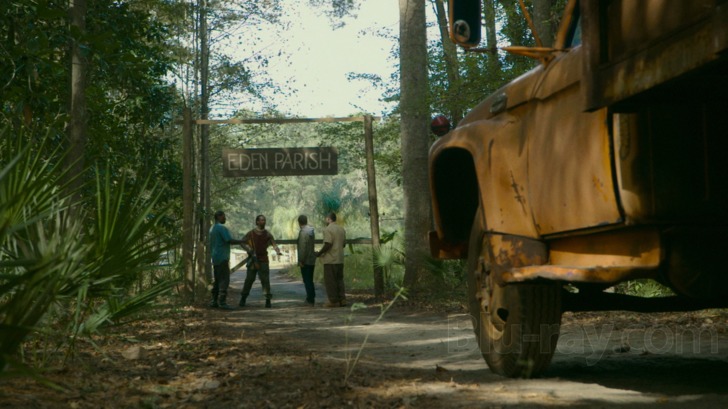
The Sacrament was one of the first feature films shot with the Canon C300, a lightweight professional-grade HD camera with a maximum resolution of 1920 x 1080. Director West and cinematographer Eric Robbins (The Roost) wanted the image to look more professional than a typical "found footage" film, but still like something shot by a documentary crew on the run and without planned lighting. In post-production, West added additional texture to suggest the look of 16mm film. Except for distortions deliberately introduced by the handheld shooting style, Magnolia Home Video's 1080p, AVC-encoded Blu-ray provides a satisfying experience of The Sacrament. Because the camera work is supposed to be professional, the image is generally far more stable than the "shaky cam" that has become the signature of so many "found footage" films (not to mention mainstream blockbusters that overuse the style). While the camera is frequently in motion, it stays steady enough during interviews and conversations to let the viewer focus on what is being said and the faces of those talking. At regular intervals, the person holding the camera sets it down, then steps in front to join the action. This simple device varies the visual rhythm by providing the illusion of a locked-down shot. Regardless of whether or not the camera is moving, the image is generally sharp and well-defined, with plenty of fine detail revealed in the Eden Parish compound and surrounding jungle. (The sole exception is the film's opening, which has been processed to resemble low-resolution TV, so that they the eye immediately identifies it as a broadcast.) Colors are mostly muted, but a few elements of the spectrum have obviously been tweaked to make them stand out, notably the green of the surrounding jungle and a few specific items in the latter third of the film that I prefer not to specify. Black levels, contrast and density all look appropriate. Magnolia has departed from its usual practice of using a BD-50 and providing generous average bitrates. The Sacrament averages only 17.99 Mbps, but the digital origination and the various interview sequences, which lack significant motion, help the material compress successfully. No artifacts were in evidence.
The Sacrament Blu-ray Movie, Audio Quality 
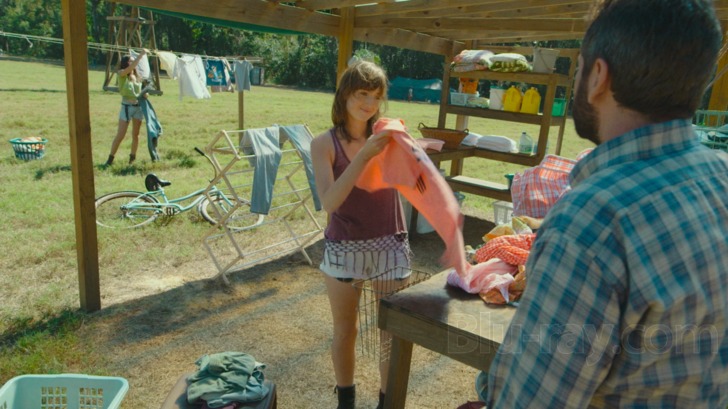
The Sacrament's 5.1 soundtrack, encoded on Blu-ray as lossless DTS-HD MA, retains the forward orientation of a typical documentary, but the film's sound design also reflects the Vice school of journalism dubbed "immersionist". Music cues from the inventive score by Tyler Bates (Guardians of the Galaxy) enter more frequently than one would hear in a traditional documentary, often beginning with a foreboding bass note and sometimes rising above the sound of the action to serve as a kind of commentary. The mix carefully distinguishes between voices in front of the camera and those "behind" it, so that you're aware of the news crew as part of the story. All of the dialogue is clearly spoken. The dynamic range is good enough to provide authority to the gunshots (warning and otherwise) fired by the guards at Eden Parish and to the sound of the helicopter that brings the crew within driving distance of the camp. The voices of the Eden Parish members singing in celebration are jubilantly rendered, until they are pushed to the background by an urgent cue from Bates's score, as the news crew spots something that doesn't fit with the happy mood.
The Sacrament Blu-ray Movie, Special Features and Extras 

- Commentary with Writer/Director Ti West and Actors AJ Bowen and Amy Seimetz: The director and his two stars share equally in recounting the experience of filming on the Georgia location where the Eden Parish set was constructed, but it is West who supplies valuable information on the development of the script and producer Eli Roth's hands-off support of the project, as well as the long editing process as West struggled to find the right pacing for the story. According to West, almost half an hour of additional exposition was removed that would have filled in background on the history of Father's group. It's unfortunate that none of this material was included as deleted scenes.
- Creating The Sacrament: Revealing the Vision (1080i; 1.78:1; 21:07): Using interviews with the cast, crew, director and producers, this short documentary traces The Sacrament from inception through filming, including the logistical challenges of constructing an entire jungle compound on a tiny budget. The participants also discuss the film's similarities to, and differences from, the "found footage" horror genre.
- Working with the Director: The Ti West Experience (1080i; 1.78:1; 5:56): One of the running themes of this short featurette is the loyalty that West inspires in people who work with him, such that both actors and crew return for subsequent films.
- Preparing for Takeoff: Behind the Scenes Helicopter Experience (1080i; 1.78:1; 4:52): This featurette shows the director, cast and crew filming a pivotal sequence. Scenes from the finished film are occasionally shown in a small window in the lower right corner of the screen.
- AXS TV: A Look at The Sacrament (1080p; 1.78:1; 3:38): This is a typical AXS TV promo, in which the film's trailer is expanded with interview clips, primarily from the "Creating The Sacrament" documentary listed above.
- Also from Magnolia Home Entertainment: The film's trailer is not included. However, the disc includes trailers for Filth, Nymphomaniac: Volume I, The Protector 2 and The Double, as well as promos for the Chideo web service and AXS TV. These also play at startup, where they can be skipped with the chapter forward button.
- BD-Live: As of this writing, attempting to access BD-Live gave the message "Check back later for updates".
The Sacrament Blu-ray Movie, Overall Score and Recommendation 
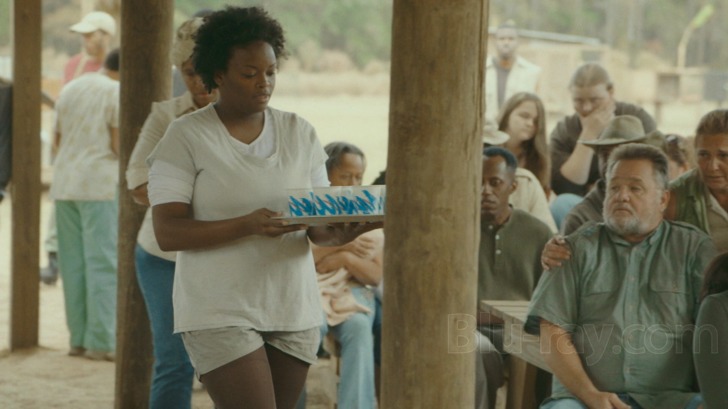
The Sacrament won't appeal to everyone, but it's less likely to satisfy if one goes into it expecting a horror film akin to Ti West's previous ventures. The marketing campaign encourages such associations, because PR people trade on whatever is familiar, especially with an actor or director who has established a reputation in a particular genre. As a portrait of a religious splinter group that began as a dream, then curdled into a nightmare—as Gene Jones has noted, the film only depicts a few days in the entire life of "Father", leaving out all the good things he accomplished—The Sacrament may be the most sympathetic portrait to date of a cult that questions whether the modern world has succeeded in providing human fulfillment. The problem comes, as it always does, when the leader who has set himself up as infallible meets a problem he cannot solve. Then he goes mad and takes everybody with him. Magnolia's Blu-ray is recommended, with the caveat that the film isn't necessarily for genre buffs.
Similar titles
Similar titles you might also like

American Mary
2012

Lifechanger
2018

Open Windows
2014

V/H/S
2012

#Horror
2015

Out of the Dark
2014

Father's Day
2011

Scream 4
Scre4m
2011

The Town That Dreaded Sundown
2014

Halloween: Resurrection
Halloween 8
2002

Sinister
2012

A Nightmare on Elm Street 3: Dream Warriors 4K
1987

Halloween II
Unrated Director's Cut
2009

Tragedy Girls
2017

Candyman 4K
Collector's Edition
1992

Child's Play
2019

The Gallows
2015

Texas Chainsaw Massacre
2022

The Rental
2020

Jackals
2016